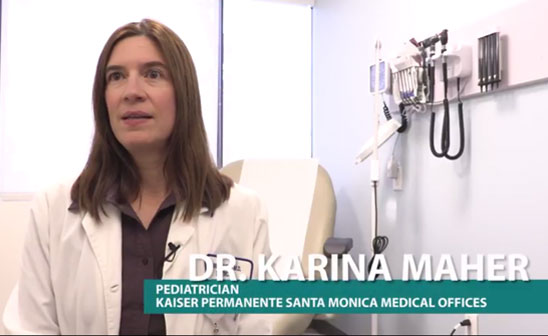This piece originally ran on August 3, 2017 as a press release, contact: Juliane Matignas.
LOS ANGELES — As the new school year approaches, pediatricians are reminding parents of the crucial role immunizations play in keeping kids healthy.
“Immunizations can help your body develop resistance to specific diseases and increase your immunity to them,” said Karina Maher, MD, a pediatrician at Kaiser Permanente’s Santa Monica Medical Offices. “It’s very important for the whole family to be up to date on vaccines to protect themselves, their children and the community.”
August is also National Immunization Awareness Month, and Dr. Maher says following the recommended immunization schedule is one of the most important things parents can do to protect their child’s health.
Disease can quickly spread among groups of children who are unvaccinated, and the child’s body may not be strong enough to fight the disease. Before vaccines, many children died from diseases that vaccines now prevent, such as whooping cough, measles and polio.
In fact, the flu causes more deaths each year than any other vaccine-preventable disease, according to the Centers for Disease Control and Prevention.
Some parents are concerned about the impact of vaccines, and are fearful that certain vaccines may play a role in children developing autism.
“There have been a lot of false claims in the news, but thorough studies have found no link between vaccines and autism,” Dr. Maher said. “Immunizations are very safe, even if your child has, or is, recovering from a minor illness such as a cold or ear infection, or even if they have a slight fever.”
Why are vaccines important?
They protect your child, family and community from preventable diseases. Without vaccinations, serious illnesses return. Children and adults who are not protected can become very sick and spread illness throughout your community. We have seen this happen recently, with outbreaks of pertussis (whooping cough) and measles in California.
What should we expect after an immunization?
Most children feel fine and go right back to their usual routine. Others have mild reactions, such as a sore arm, swelling at the site of the shot, or a low fever. Some babies may be fussy or sleepy afterward.
Serious side effects are very rare. Keep in mind that the risks of having mild side effects from the shots are minimal compared to the risk of getting seriously ill from diseases we can prevent.
Kaiser Permanente West Los Angeles has a pediatrician available for interview on this topic. Please take a look at this video on immunizations, featuring Dr. Maher. Please contact us if you would like to speak to a Kaiser Permanente pediatrician regarding immunizations.
About Kaiser Permanente
Kaiser Permanente is committed to helping shape the future of health care. We are recognized as one of America’s leading health care providers and not-for-profit health plans. Founded in 1945, Kaiser Permanente has a mission to provide high-quality, affordable health care services and to improve the health of our members and the communities we serve. We currently serve 11.8 million members in eight states and the District of Columbia. Care for members and patients is focused on their total health and guided by their personal physicians, specialists and team of caregivers. Our expert and caring medical teams are empowered and supported by industry-leading technology advances and tools for health promotion, disease prevention, state-of-the-art care delivery and world-class chronic disease management. Kaiser Permanente is dedicated to care innovations, clinical research, health education and the support of community health. For more information, go to: kp.org/share.




